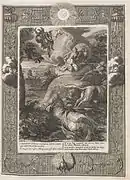Alcyone (daughter of Sciron)
In Greek mythology, Alcyone (Ancient Greek: Ἀλκυόνη, romanized: Αlkuónē, lit. 'kingfisher') is a minor figure who was transformed into the bird bearing her name after she was murdered by her own father Sciron.[1] Her tale is a variation on the more known myth of the kingfisher, starring Alcyone and Ceyx.[2]
Etymology
The proper name Ἀλκυόνη is derived from the ancient Greek word for kingfisher (Ancient Greek: ἀλκυών, romanized: alkuṓn).[3] Its ultimate origin is unknown, though it is probably a loan from a non-Indo-European language.[4] A false folk etymology connecting it with the word ἅλς (háls, meaning "salt") gave rise to the alternative spelling ἁλκυών (halkuṓn).[3]
Mythology
According to Pseudo-Probus's commentary on Virgil, Alcyone was the daughter of an Attic man named Sciron, the son of Polypemon. Her father, who wished to see his daughter wed at last, ordered her to look for a husband, and Alcyone proceeded to sleep with many men. When he found out about his daughter's promiscuity, Sciron was enraged, and cast Alcyone into the sea, whereupon she was transformed into a kingfisher, a bird beloved by Thetis.[5][6]
Pseudo-Probus says that this version is Theodorus's, from a lost Metamorphoses work of his; he adds that Ovid in his own Metamorphoses is going by Nicander's version (which has also been lost).[5][6][7] In the Metamorphoses, Ovid writes that Alcyone and Ceyx were a beloved couple. Ceyx died at sea, and when Alcyone learnt of his demise, she threw herself off a cliff. Hera, pitying the couple, transformed them both into kingfishers,[8] a story also supported by Virgil,[9] Apollodorus[10] and Hyginus.[11] Pseudo-Probus, Ovid and Hyginus all make the metamorphosis the origin of the etymology for "halcyon days", the seven days in winter when storms never occur so the birds can lay their eggs.
Despite Ovid going by a different version than the one pseudo-Probus had in mind, he evidently knew (and referenced) both of them, albeit the second in a very subtle and obscure way in the lines:[7][6]
Borne hence by her dragons sprung from Titans's blood, she entered the citadel of Pallas, which beheld [...] the granddaughter of Polypemon upborne by new-sprung wings.
It is possible that the original myth was a simpler version closer to Nicander's one, where a woman named Alcyone wept for her unnamed husband; Ceyx was probably added later due to him being an important figure in poetry, and having a wife named Alcyone (as evidenced from the Hesiodic poem Wedding of Ceyx).[12]
See also
References
- Wright, Rosemary M. "A Dictionary of Classical Mythology: Summary of Transformations". mythandreligion.upatras.gr. University of Patras. Retrieved January 3, 2023.
- Mitsis & Ziogas 2016, p. 118.
- Liddell & Scott 1940, s.v. άλκυών.
- Beekes 2009, p. 71.
- Pseudo-Probus, On Virgil's Georgics 1.399
- Pagès & Villagra 2022, p. 206.
- Gildenhard 2017, p. 164.
- Ovid, Metamorphoses 11.410-748
- Virgil, Georgics 1.399
- Apollodorus, Bibliotheca 1.7.4
- Hyginus, Fabulae 65
- Forbes Irving 1990, p. 240.
Bibliography
- Apollodorus (1921). The Library. Loeb Classical Library 121. Vol. I: Books 1-3.9. Translated by James G. Frazer. Cambridge, MA: Harvard University Press.
- Beekes, Robert S. P. (2009). Lucien van Beek (ed.). Etymological Dictionary of Greek. Leiden Indo-European Etymological Dictionary Series. Vol. 1. Leiden, the Netherlands: Brill Publications. ISBN 978-90-04-17420-7.
- Forbes Irving, Paul M. C. (1990). Metamorphosis in Greek Myths. Clarendon Press. ISBN 0-19-814730-9.
- Gildenhard, Ingo (July 5, 2017). Transformative Change in Western Thought: A History of Metamorphosis from Homer to Hollywood. Routledge. ISBN 978-1-907975-01-1.
- Hyginus, Gaius Julius, The Myths of Hyginus. Edited and translated by Mary A. Grant, Lawrence: University of Kansas Press, 1960.
- Liddell, Henry George; Scott, Robert (1940). A Greek-English Lexicon, revised and augmented throughout by Sir Henry Stuart Jones with the assistance of Roderick McKenzie. Oxford: Clarendon Press. Online version at Perseus.tufts project.
- Mitsis, Phillip; Ziogas, Ioannis (July 28, 2016). Wordplay and Powerplay in Latin Poetry. Germany: De Gruyter. ISBN 978-3-11-047252-3.
- Ovid (1916). Metamorphoses. Loeb Classical Library 42. Vol. I: Books 1-8. Translated by Frank Justus Miller, revised by G. P. Goold. Cambridge, MA: Harvard University Press.
- Ovid (1916). Metamorphoses. Loeb Classical Library 43. Vol. II: Books 9-15. Translated by Frank Justus Miller, revised by G. P. Goold. Cambridge, MA: Harvard University Press.
- Pagès, Joan; Villagra, Nereida (May 9, 2022). Myths on the Margins of Homer: Prolegomena to the Mythographus Homericus. De Gruyter. ISBN 9783110751154.
- Valerius Probus, In Vergillii Bucolica et Georgica Commentarius, 1848. Online version on Google books.
- Virgil (1916). Eclogues. Georgics. Aeneid: Books 1-6. Loeb Classical Library 63. Translated by H. Rushton Fairclough, revised by G. P. Goold. Cambridge, MA: Harvard University Press.
.jpg.webp)
.jpg.webp)
